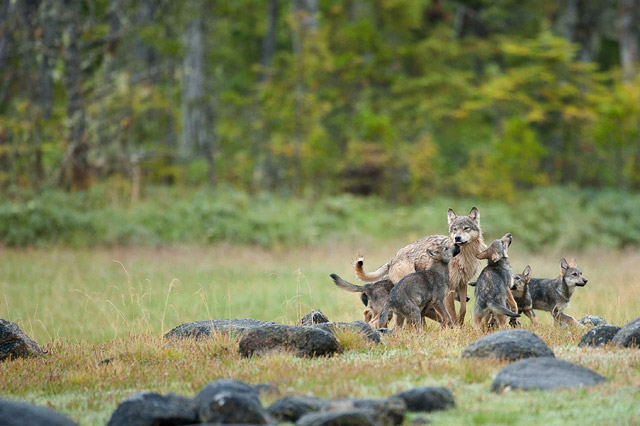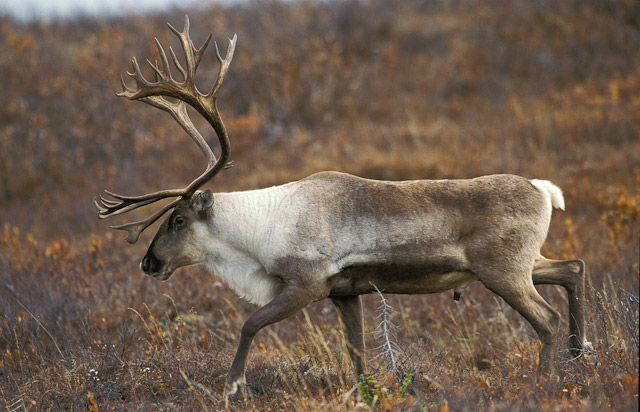|
| |
| 18. Januar 2015 |
Provinzregierung von BC lässt über 180 Wölfe töten – als Versuch,
die Überlebenschancen bedrohter Bergkaribus zu verbessern |
| |
| Nachdem es die Provinzregierung von BC jahrzehntelang versäumt hat, die kritischen Lebensräume der vom Aussterben bedrohten Bergkaribus zu schützen, sollen jetzt in einem letzten ebenso verzweifelten wie vermutlich untauglichen Versuch, sie doch noch zu retten, über 180 Wölfe von Helikoptern aus getötet werden. |
| In einer Presseerklärung von Pacific Wild vom 15. Januar 2015 zu diesem Wolfs-Eliminierungsplan der Provinzregierung heißt es: „Pacific Wild is condemning today’s announcement by the B.C. government to slaughter over 180 wolves by aerial shooting. ‚After decades of destroying critical caribou habitat, dismantling the Forest Practices Code and gutting environmental oversight and protection, the BC government in a final desperate act of cruelty has declared a war on wolves‘, said Ian McAllister, Conservation Director for Pacific Wild. ‚When will this government learn that killing wolves will not bring endangered caribou back in the absence of habitat protection‘, he further stated. An unprecedented amount of submissions were made in response to the B.C. governments draft Wolf Management Plan in 2013 with the overwhelming majority opposed to government sponsored wolf killing. Wolves are highly social and intelligent animals and research shows that predator kill programs increase reproductive rates in wolves and destabilizes pack structure causing more predation of livestock and other non-native prey. It is the view of Pacific Wild that this announcement is scientifically unsound and that wolves are being used as a scapegoat to divert attention from the fundamental problem of ongoing habitat destruction and displacement caused by human encroachment. ‚This is not management, it’s a tax-payer funded kill program of one of our most iconic species‘, he further stated. ‚This is not only a horrific day for wolves in British Columbia but a sad day for public engagement and policy that will surely bring international condemnation to our borders.‘“ |
| „While the government is not moving forward to protect adequate amounts of habitat to save the caribou, they’re instead using wolves as a scapegoat and planning just a horrific level of aerial killing in the coming months. This is truly a war on wolves in British Columbia“, sagte Ian McAllister von Pacific Wild. „When will this government learn that killing wolves will not bring endangered caribou back in the absence of habitat protection?“ |
| |
 |
| Wolfsfamilie in British Columbia |
© Klaus Pommerenke |
|
| |
| Über Jahrzehnte hinweg sah die Provinzregierung dem Niedergang der Bergkaribus nahezu tatenlos zu und akzeptierte die Zerstörung ihres Lebensraumes durch Forstkonzerne und Industrie. Jetzt werden die Wölfe zu den Sündenböcken erklärt und müssen für die Versäumnisse der Provinzregierung mit ihrem Leben zahlen. Die Wintereinstände der Bergkaribus sind Wälder, die ihnen ausreichend Flechten – ihre bevorzugte Nahrungsquelle – bieten. Die langsam wachsenden Flechten finden sich v. a. in alten Nadelwäldern und diese wurden von der Forstindustrie größtenteils abgeholzt und durch Holzäcker ersetzt, die im Kurzumtrieb bewirtschaftet werden. Das Stangenholz dieser lichtlosen „Tree Farms“ wird so früh abgeerntet, dass Flechten gar nicht erst in größerem Maße wachsen können. Hierdurch finden die Karibus im Winter nicht genügend Nahrung, werden geschwächt und sind damit auch leichtere Beute für Wölfe, zumal die Holzäcker durch Forststraßen und Kahlschläge stark parzelliert wurden und den Karibus weniger Schutz bieten. „These caribou are on a long-term slide to extinction as a consequence of what people have done, and that’s clearly where the blame should go … I think the provinces have been unwilling to do what would have been absolutely necessary to do to save caribou, and that was to protect their habitat initially. You can’t easily recover the habitat that it’s lost“, sagte Professor Paul Paquet von der Raincoast Conservation Foundation. Auch Chris Darimont, Wolfsforscher und Hakai-Professor an der University of Victoria, verurteilt die geplanten Wolfstötungen scharf und betrachtet sie darüber hinaus als ineffektiv, um die Karibus zu retten, da ähnliche Versuche in Alberta bereits erfolglos geblieben sind. „This is a last ditch, Hail Mary effort to save caribou that are on their way out not because of wolves, but because of development, and aggressive development, by humans in their habitat for a few decades now.“ Zu der durch Forstindustrie und Freizeiteinrichtungen wie Snow Mobile-Parcouren und Wintersportzentren transformierten Landschaft meinte er: „These landscapes are not going to favour caribou again for a very long time. The damage that’s been done is greater than the ability of caribou to recover even with aggressive intervention.“ |
| Die Tötung von Wölfen dient der Provinzregierung von BC nach wie vor als Alibi, der weiteren Zerstörung von Lebensräumen der Karibus nicht wirklich Einhalt zu gebieten. Das Aussterben der Karibus ist aufgrund ihres Lebensraumverlustes bedauerlicherweise längst vorprogrammiert, auch wenn alle Wölfe getötet werden könnten. Erst 2007 – als es schon längst zu spät war – hatte die Provinzregierung einen halbherzigen Mountain Caribou Recovery Implementation Plan erlassen, erst 2012 den Peace Northern Caribou Implementation Plan. Damals bestand die South Selkirk-Karibuherde nur noch aus 27 Tieren, im März 2014 waren es gerade noch 18. Von der Burnt Pine-Herde ist nur noch ein einziges Tier übrig geblieben. |
| |
 |
| Karibu-Bulle |
© Klaus Pommerenke |
|
| |
| In der Presseerklärung des Ministry of Forests, Lands and Natural Resource Operations vom 15.01.2015 (Government acting to save endangered caribou) heißt es: „The Ministry of Forests, Lands and Natural Resource Operations is taking immediate action to save caribou herds under threat from wolf predation in two separate and targeted actions: one in the South Selkirk Mountains and the other in the South Peace. |
| The South Selkirk herd is at high risk of local extinction. The population has declined from 46 caribou in 2009 to 27 in 2012, and to 18 as of March 2014. Evidence points to wolves being the leading cause of mortality. The South Selkirk is a trans-boundary herd, and caribou move freely between B.C., Washington and Idaho. Officials from B.C., Washington and Idaho States, First Nations, the U.S. Forest Service and the U.S. Fish and Wildlife Service have been working together on a research project and have collared six of the remaining 18 caribou to help investigate the cause of decline. Wolves have killed two of the remaining caribou (11 % of the herd) in the past 10 months. Ministry staff will aim to remove up to 24 wolves by shooting them from a helicopter before snow melt. |
| In four caribou herds in the South Peace (Quintette, Moberly, Scott and Kennedy-Siding), populations are also decreasing and wolves are a key factor. At least 37 % of all adult mortalities have been documented as wolf predation. Working in partnership with Treaty 8 First Nations, the ministry’s goal is to remove up to 120-160 wolves in the South Peace, again by shooting them from a helicopter before snow melt. Caribou populations in a larger South Peace herd (Graham) will be monitored, but receive no predator control measures, in order to allow for comparison on the effectiveness of the program. Hunting and trapping of wolves have not effectively reduced populations and may even split up packs and increase predation rates on caribou. Habitat recovery continues to be an important part of caribou recovery, but cannot address the critical needs of these herds in the short term.“ |
In diesen Meldungen liefert das Ministerium auch Zahlen (die teilweise aus dem Jahr 2009 stammen) über die noch existierenden Kleinstherden der Karibus und zu Schutzmaßnahmen inclusive des Wolfstötungsprogramms.
Sie finden diese Informationen unter: www.newsroom.gov.bc.ca/2015/01/government-acting-to-save-endangered-caribou.html |
| |
 zurück zurück |
|
|

